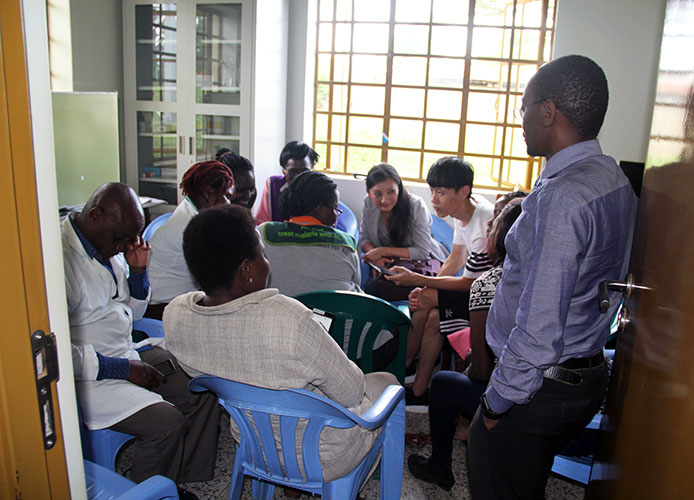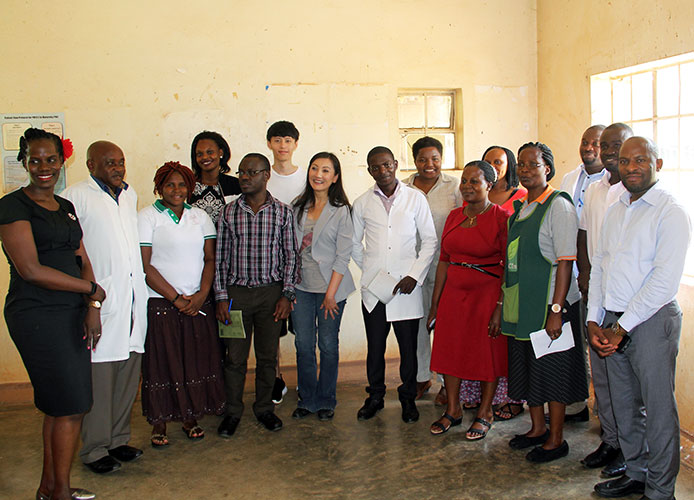Yih uses systems engineering to help improve Ugandan healthcare procedures
Yuehwern Yih, Professor of Industrial Engineering, Academic Director of LASER PULSE, and Associate Director of Regenstrief Center for Healthcare Engineering, was one of only two Purdue faculty members to receive Grand Challenges Explorations (GCE) funding in Nov. 2017. Her project, "Demand sensing and digital tracking for maternal and child health in Uganda", seeks to save the lives of Ugandan mothers giving birth by developing a better, more efficient supply system for essential medications and supplies.
According to Yih, many young Ugandan mothers die during childbirth because hospitals aren’t always stocked with essential medical supplies. In the current system, when a pregnant mother visits health centers for a standard prenatal care, the standard of care is often compromised due to the out of stock of laboratory test supplies or medications. Consequently, high risk pregnancies and deliveries are not detected, prevented, and prepared for. She wants to tackle this multifaceted problem by using systems engineering concepts to track patient conditions, demands, and medical supplies to ensure the right medications are at the place at the time to save lives during childbirth.
Yih and her team, including IE PhD students, Dawei Wang, Rhoann Kerh, and Sungbum Jun, are gathering critical supply data using an app they developed called E+TRA Health (Electronic TRAnsparency and TRAcking for Health). This electronic supply chain management system tracks healthcare commodities to predict patient demands and manage the supply chain. Her team is testing this solution at two Ugandan Level IV Health Centers (county mini-hospitals) to evaluate its effect on the efficiency of ordering and maintaining supplies and on patient outcomes.
After an initial fact-finding trip in Dec. 2017, Yih and Wang traveled to Uganda Sept. 23-30, 2018. They met with stakeholders and policy makers, collected baseline information, installed E+TRA Health, trained healthcare workers in its use, troubleshot the system, and developed daily workflow routines for healthcare staff.
"We trained the staff, installed and deployed E+TRA Health at two Health Center IV facilities," said Yih. "We are collecting data and developing the predictive model for demands of essential supplies for high-risk childbirth."
Yih's research team will work on the next phase of the project - collecting data for the next three months, and developing an inventory predictive model and embedding it into E+TRA Health so that in the future it will automatically generate purchase orders and reports. This will ensure that they can match the supply with the demand.
This project involves a multidisciplinary research team, including researchers from Purdue IE, Purdue University's Regenstrief Center for Healthcare Engineering and the Global Engineering Programs and Partnerships' Innovation for International Development Laboratory (I2D Lab), as well as the Management Sciences for Health (MSH) and the USAID-funded Resilient Africa Network (RAN).
Grand Challenges is a family of initiatives fostering innovation to solve key global health and development problems. In 2007, the Gates Foundation launched Grand Challenges Explorations (GCE) to engage more of the world’s innovators more quickly. Twice each year, GCE invites high-risk, high-reward proposals on a range of challenges to support innovative thinkers worldwide to help solve persistent global health and development challenges.
Related Link: https://engineering.purdue.edu/IE/news/2017/yih-gates-gce


